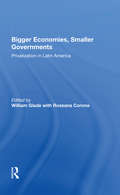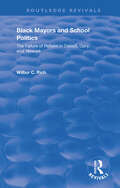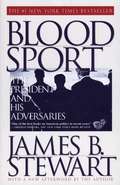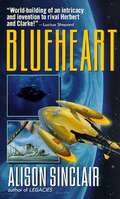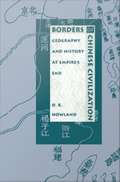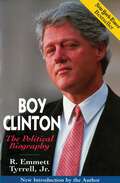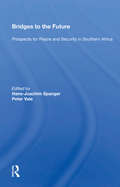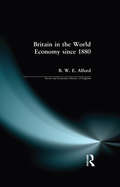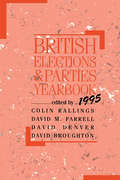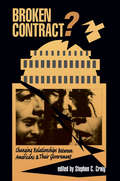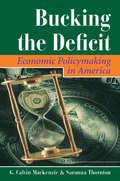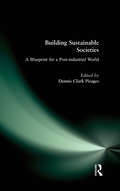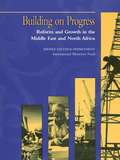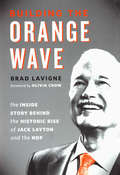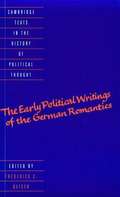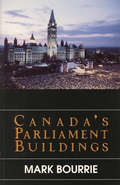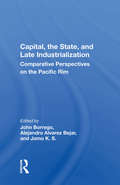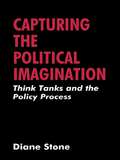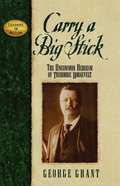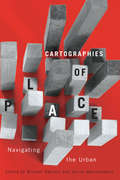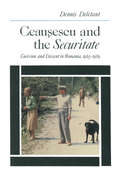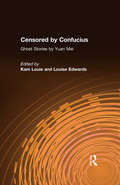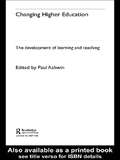- Table View
- List View
Big Girls Don't Cry
by Connie BriscoeBorn into a comfortable Washington, D.C., home, Naomi Jefferson leads a life that is only occasionally marred by racism. As a teenager in the 1960s, her biggest concern centers around virginity. But all that changes when her older brother, Joshua-who seems destined for greatness-is killed in a tragic car accident on his way to a civil rights demonstration. Now the rift between black and white America becomes much too personal, and Naomi embarks on a journey to honor her brother's legacy- and to find herself
Bigger Economies, Smaller Governments: The Role Of Privatization In Latin America
by William GladePrivatization of large national enterprises has been the most far-reaching of Latin America's dramatic structural reforms, the objective being to underpin fiscal stability by shedding huge capital requirements. But long-term gains to the economy also depend on such factors as increased efficiency through better communications and infrastructure and
Black Mayors and School Politics: The Failure of Reform in Detroit, Gary and Newark
by Wilbur C RichFirst Published in 1996. Some people believe that if inner-city black children had excellent schools, they would perform better in them. Granted, schools are a part of the problem, but they are not all of the solution. Schools are only buildings where teachers, administrators, and students interact. Learning is a more much complex process. There are many forces arrayed against an inner-city child that preclude him/her from mastering the education process. Among these forces are poverty, family instability, disruptive classroom environments, and incompetent teachers. There seems to be no end to research and speculation about how to overcome these forces. However, the author asserts that the gap between black and white children continues to widen. With research beginning in 1989, exploring three school systems for this study: Detroit, Michigan; Gary, Indiana; and Newark, New Jersey. The book presents a systematic survey of school politics in these three cities, giving particular emphasis to local reform efforts.
Blood Sport: The President and His Adversaries
by James B. StewartIn July 1993, White House official Vincent Foster wrote an anguished lament: "in Washington...ruining people is considered a sport." Nine days later, Foster was dead. Shock at the apparent suicide of one of President Clinton's top aides turned to mystery, then suspicion, as the White House became engulfed in an ever-widening net of unanswered questions. Among the confidential matters Foster was working on when he died was the Clinton's ill-fated investment in Whitewater, an Arkansas land development. Soon conspiracy theories were circulating, alleging that Foster was murdered because he knew too much. And the Whitewater affair, a minor footnote to the 1992 presidential campaign, was suddenly resurrected in the national media. To a degree that left them sunned and at times depressed, the president and the first lady have been buffeted by a succession of scandals, from the first lady's profitable commodities trading to the sexual harassment allegations of Paula Jones. Like his predecessors, the Clinton presidency son found itself engulfed in allegations of scandal, conspiracy, and cover-up.Drawing on hundreds of interviews, many with people speaking publicly for the first time, James B. Stewart also sheds startling new light on these and other mysteries of the Clinton White House. In a fast-paced narrative that ranges from a backwater town in the Ozarks to the Oval Office, from newsrooms in New York and Los Angeles to offices of conservative think tanks and special prosecutors, the result is an unprecedented portrait of political combat as it is waged in America today.as politics and acting under duress in the White House. It is the story of the people around them, many disgraced or tarnished by what happened: Bernard Nussbaum, the embattled White House counsel; Webb Hubbell, the Arkansas ally at the Justice Department who confessed to felonies; Bill Kennedy, a top White House lawyer forced to return to Little Rock. And it is the full story of Vince Foster, a quiet, reserved, and loyal confidant and friend of the first family whose tortured career in Washington can be seen as a metaphor for the toll public service exacts today. Going beyond the news headlines, Blood Sport also tells the fascinating stories of key figures at the heart of the action, such as Jim McDougal, once Clinton's political and financial mentor, and his glamorous but naive wife, Susan, who swept up the Clintons into their real estate empire, then faced financial ruin. It is the story of top national reporters and editors such as Jeff Gerth of The New York Times, who broke the Whitewater story only to find himself the object of controversy. It is the story of David Bossie, the tireless conservative operative who became a one-man army against the Clintons and even penetrated a network news operation. It is the story of Paula Jones, a small-town girl with dreams of Hollywood, and of the Arkansas state troopers who broke their code of silence to add fuel to the Clinton scandals. It is the story of prosecutors Kenneth Starr and Robert Fiske, the secretive, powerful independent counsels whose wide-ranging investigations could vindicate - or destroy - a president. Set against a backdrop of national affairs and political intrigue, Blood Sport is more than the story of the Clintons' political trial by combat. It is a vivid portrait of our times, destined to be an enduring examination of political power and its limitations, of information and its dissemination, and, ultimately, of human nature. For anyone interested in American democracy, the revelations of Blood Sport will reverberate for this and future presidencies.
Blueheart
by Alison SinclairThe endless seas... Of all the worlds discovered by star-wandering humanity, Blueheart, with its endless, storm-tossed seas is the most beautiful. And the most doomed. Plans are already being made to terraform the planet into another Earth. But deep under the floating forests, the renegade Adaptives--the planet's first colonists--have another dream: the creation of a new aquatic human subspecies. As their struggle erupts into violence, Rache is called back to the seas, where he must choose between his humanity and his world.
Borders of Chinese Civilization
by D. R. HowlandD. R. Howland explores China's representations of Japan in the changing world of the late nineteenth century and, in so doing, examines the cultural and social borders between the two neighbors. Looking at Chinese accounts of Japan written during the 1870s and 1880s, he undertakes an unprecedented analysis of the main genres the Chinese used to portray Japan--the travel diary, poetry, and the geographical treatise. In his discussion of the practice of "brushtalk," in which Chinese scholars communicated with the Japanese by exchanging ideographs, Howland further shows how the Chinese viewed the communication of their language and its dominant modes--history and poetry--as the textual and cultural basis of a shared civilization between the two societies. With Japan's decision in the 1870s to modernize and westernize, China's relationship with Japan underwent a crucial change--one that resulted in its decisive separation from Chinese civilization and, according to Howland, a destabilization of China's worldview. His examination of the ways in which Chinese perceptions of Japan altered in the 1880s reveals the crucial choice faced by the Chinese of whether to interact with Japan as "kin," based on geographical proximity and the existence of common cultural threads, or as a "barbarian," an alien force molded by European influence. By probing China's poetic and expository modes of portraying Japan, Borders of Chinese Civilization exposes the changing world of the nineteenth century and China's comprehension of it. This broadly appealing work will engage scholars in the fields of Asian studies, Chinese literature, history, and geography, as well as those interested in theoretical reflections on travel or modernism.
Boy Clinton: The Political Biography
by R. Emmett Tyrrell Jr.A New York Times Bestseller! Boy Clinton traces the formative influence of the hustlers and rogues who populated the hometown of the young, fatherless Bill Clinton all the way to the drug-trafficking, tax evading governor and lying, obstructing president he would one day become. Tyrrell's classic expose continues to offer a penetrating and often humorous glimpse into the checkered past of Bill and Hillary long before Monica, Benghazi, and the shady Clinton Foundation dominated the spotlight.
Bridges To The Future: Prospects For Peace And Security In Southern Africa
by Hans-Joachim Spanger Peter ValeWith the ending of white minority rule in South Africa, the democratic elections in Mozambique and the renewed efforts at a negotiated settlement of civil war in Angola, Southern Africa has entered a new era. Much more is required, however, to ensure lasting peace and security. The states on the subcontinent are confronted with the twofold task of
Britain in the World Economy since 1880 (Social and Economic History of England)
by Bernard W.E. AlfordBernard Alford reviews the changing role, and diminishing influence, of Britain within the international economy across the century that saw the apogee and loss of Britain's empire, and her transformation from globe-straddling superpower to off-shore and indecisive member of the European Community. He explores the relationship between empire and economy; looks at economic performance against economic policy; and compares Britain - through and beyond the Thatcher years - with her European partners, America and Japan. In assessing whether Britain's economic decline has been absolute or merely relative, he also illuminates the broader history of the world economy itself.
British Elections and Parties Yearbook
by David Denver David M. Farrell David Broughton Colin RailingsThis volume looks at the political events and discusses the major issues of 1994, most notably the European parliament elections.
Broken Contract?: Changing Relationships Between Americans and Their Government (Transforming American Politics)
by Stephen C CraigIn 1992, it was Bill Clinton's New Covenant. In 1994, it was the Republicans' Contract with America. In 1996, it is likely to be a whole new set of circumstances. Nonetheless, one theme will prevail: Citizens and their government distrust one another, and it will take major changes on both sides to restore confidence in the relationship.Broken Contract? describes the elements of voter disaffection, party decline, mass mediation, social conflict, and government by referendum so prevalent in the politics of the 1990s. Original essays by leading scholars provide a unique perspective on what is happening today, how we arrived at this point, and what the future may hold if present trends continue. Highlights include innovative insights into the politics of disillusion along race, class, and gender lines; the “Perot people” of '92, where they went in '94 and will go in '96; and “talk-show democracy,” from Larry King to Rush Limbaugh and the power of televangelism.Broken Contract? is a volume with a finger on the pulse of the temperament of the times. It demonstrates, in an engaging and accessible fashion, that the Contract with America is neither the first nor the last bargain to be struck with the American public in an effort to mend its broken trust.
Bucking the Deficit: Economic Policymaking in America
by Saranna ThorntonFor years now, Americans have called for a balanced budget, debt reduction, and fiscal sanity. Yet the federal government continues to spend beyond its income, driving the level of federal debt up and public confidence down. Why is that? Why have the monsters of public finance—pork-barrel spending, entitlements, and the deficit—remained unchecked for so long? What effects have they had on our economy and our politics? What, if anything, can be done to tame them? This concise, well-written primer of American political economy offers answers to these questions and more, all the while covering a vast and complicated intellectual terrain in an accessible and engaging way. Political scientist G. Calvin Mackenzie and economist Saranna Thornton combine forces here to clear up some of the mysteries of contemporary economic theory and practice. They take us on a sweeping tour of the economic turning points in our national history and then go on to discuss what it will take to make sound economic policy and, ultimately, good government for the twenty-first century. Everyone—but especially students of American government, public policy, economics, and business—should have a copy of this on the shelf to help them make sense of the economic news and its political ramifications.
Building Sustainable Societies: A Blueprint for a Post-industrial World
by Dennis Clark PiragesA collection of articles addressing the issue of whether the industrial model of human progress can be sustained in the long term. It asks what the social, political, economic and environmental implications as well as potential solutions to the problem of resource-intensive growth are.
Building the Orange Wave
by Brad LavigneBrad Lavigne was not just the campaign manager of the New Democratic Party's 2011 breakthrough campaign that took Jack Layton from last place to Official Opposition. He was also a key architect of Layton's overnight success that was ten years in the making. In Building the Orange Wave, Lavigne recounts the dramatic story of how Layton and his inner circle developed and executed a plan that turned a struggling political party into a major contender for government, defying the odds and the critics every step of the way. The ultimate insider's account of one of the greatest political accomplishments in modern Canadian history, Building the Orange Wave takes readers behind the scenes, letting them eavesdrop on strategy sessions, crisis-management meetings, private chats with political opponents, and internal battles, revealing new details of some of the most important political events of the last decade.
Cambridge Texts in the History of Political Thought: The Early Political Writings of the German Romantics
by Frederick C. BeiserThe early romantics had an ambition still relevant today: to find a middle path between conservatism and liberalism, between a community ethic and individual freedom. Frederick Beiser's edition comprises all kinds of texts, from essays to jottings from notebooks. All have been translated anew, many for the first time.
Canada's Parliament Buildings
by Mark BourrieThree beautiful gothic buildings loom over the Ottawa River just below the historic Chaudiere Falls. They are the seat of Canada’s federal government, visited by thousands of people each year. Canada’s Parliament Buildings, filled with heraldry and history, instill pride in our country and give visitors a deep sense of being Canadian. Constructed in controversy, and steeped in decades of political lore, the Parliament Buildings have been the stage for the evolution of Canada from a small colony to one of the great nations of the world. This fascinating book takes you behind the scenes of Parliament Hill, examines the architecture, heraldry, and history of the buildings, and gives readers an understanding of the important role of Parliament in our society. Profusely illustrated with contemporary and historic photographs, this beautiful book belongs on the shelf of everyone who has toured the Parliament Buildings. It will also appeal to those interested in Canadian history and politics.
Capital, The State, And Late Industrialization: Comparative Perspectives On The Pacific Rim
by Jomo K. S. John Borrego Alejandro Alvarez BejarThis book explores the foundation and nature of the relationship between capitalist accumulation and the state in East Asia and Latin America that has profoundly influenced industrialization and macroeconomic performance. Scholars from both sides of the Pacific offer critical perspectives on the differing fates of the two regions, especially over t
Capturing the Political Imagination: Think Tanks and the Policy Process
by Diane StoneThink tanks are proliferating. Although they are outside of government, many of these policy research institutes are perceived to influence political thinking and public policy. This book develops ideas about policy networks, epistemic communities and policy learning in relation to think tanks.
Carry a Big Stick: The Uncommon Heroism of Theodore Roosevelt (Leaders in Action Series)
by George GrantThis volume in the Leaders in Action series presents the life of Teddy Roosevelt: adventurer, journalist, rancher, legislator, governor, vice president and president of the United States, and an inspiration to people of his own time and of ours.
Cartographies of Place
by Janine Marchessault Michael DarrochMedia are incorporated into our physical environments more dramatically than ever before - literally opening up new spaces of interactivity and connection that transform the experience of being in the city. Public gatherings and movement, even the capabilities of democratic ideology, have been redefined. Urban Screens, mobile media, new digital mappings, and ambient and pervasive media have all created new ecologies in cities. How do we analyze these new spaces? Recognition of the mutual histories and research programs of urban and media studies is only the beginning. Cartographies of Place develops new vocabularies and methodologies for engaging with the distinctive situations and experiences created by media technologies which are reshaping, augmenting, and expanding urban spaces. The book builds upon the rich traditions and insights of a post-war generation of humanist scholars, media theorists, and urban planners. Authors engage with different historical and contemporary currents in urban studies which share a common concern for media forms, either as research tools or as the means for discerning the expressive nature of city spaces around the world. All of the media considered here are not simply "free floating," but are deeply embedded in the geopolitical, economic, and material contexts in which they are used. Cartographies of Place is exemplary of a new direction in interdisciplinary media scholarship, opening up new ways of studying the complexities of cities and urban media in a global context.
Ceausescu and the Securitate: Coercion and Dissent in Romania, 1965-1989
by Dennis DeletantFirst Published in 2017. Routledge is an imprint of Taylor & Francis, an Informa company.
Censored by Confucius: Ghost Stories by Yuan Mei
by Kam Louie Louise Edwards Yuan Mei"The one hundred-some stories depict the important role ghosts played in the lives of the Chinese, as well as revealing a great deal about sex, revenge, transvestism, corruption, and other topics banned by Mei's puritanical mid-Qing society". -- Reference & Research Book News.
Changing Higher Education: The Development of Learning and Teaching (SEDA Series)
by Paul AshwinMaking sense of the many changes that have taken place in learning and teaching in higher education in recent years, Changing Higher Education also offers insights into how higher education might develop in the future. Using the work of Lewis Elton as a starting point, leading researchers and practitioners in the field examine and reflect on different aspects of the changing nature of higher eduction. These experts: * outline changes in higher education and ways of thinking about teaching and learning over the last thirty years. * analyse the development of students’ learning * examine the development of learning technologies in higher education * consider the development of the accreditation and scholarship of teaching in higher education * develop a framework through which to understand and question the future development of learning and teaching in higher education. Aimed at staff and educational developers, and those studying postgraduate qualifications in learning and teaching in higher education, this is an insightful framework through which to understand and question on-going developments in higher education.
Changing Societies, Changing Party Systems
by Heather StollHow do changes in society that increase the heterogeneity of the citizenry shape democratic party systems? This book seeks to answer this question. It focuses on the key mechanism by which social heterogeneity shapes the number of political parties: new social groups successfully forming new, sectarian parties. Why are some groups successful at this while others fail? Drawing on cross-national statistical analyses and case studies of Sephardi and Russian immigration to Israel and African American enfranchisement in the United States, this book demonstrates that social heterogeneity does matter. However, it makes the case that to understand when and how social heterogeneity matters, factors besides the electoral system – most importantly, the regime type, the strategies played by existing parties, and the size and politicization of new social groups – must be taken into account. It also demonstrates that sectarian parties play an important role in securing descriptive representation for new groups.

